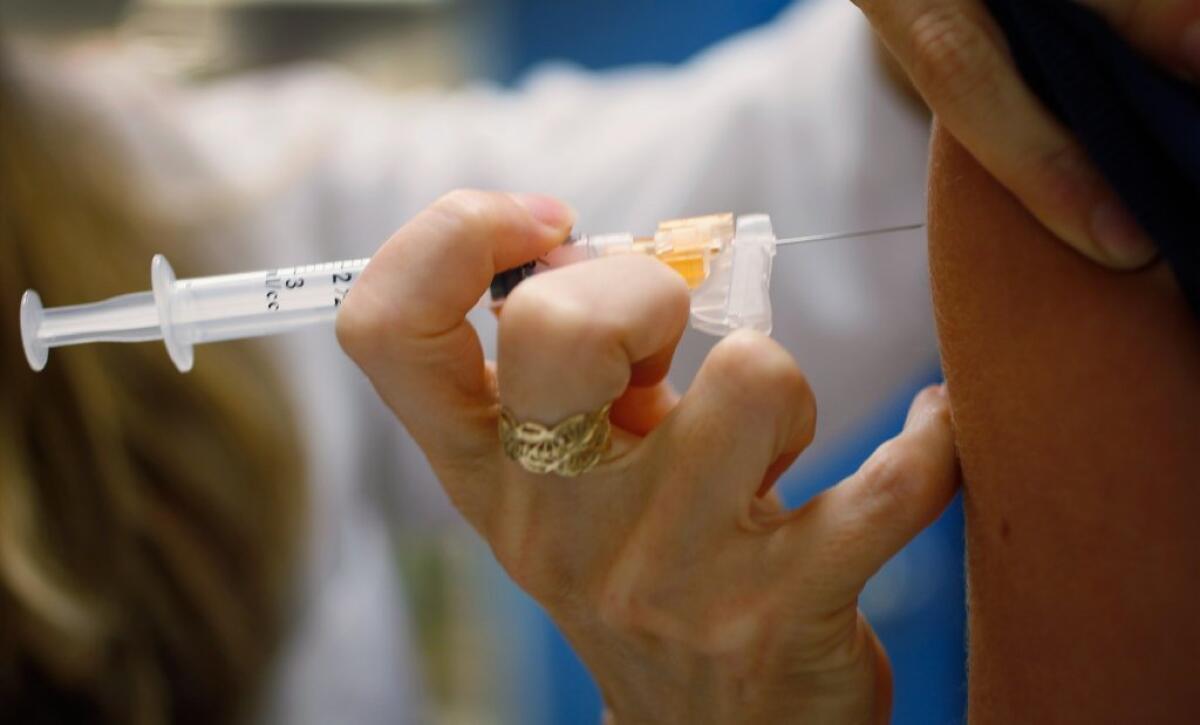Vaccine that targets 9 strains of HPV boosts cancer protection, study says

- Share via
When it comes to HPV vaccines, more protection is better. A new version of the vaccine that fights nine strains of human papillomavirus offered greater cancer protection for women than the earlier one that targets only four, researchers reported Wednesday.
A multinational study involving thousands of women found that Merck’s Gardasil 9 worked as well as the original Gardasil at preventing infections caused by HPV-16 and HPV-18. Together, these strains are responsible for 70% of all cases of cervical cancer.
Gardasil 9 also prevented infections due to HPV strains 31, 33, 45, 52 and 58. That translates into protection against 85% to 90% of HPV-related cancers, according to the study.
Both versions of Gardasil block HPV-6 and HPV-11, the strains that cause 90% of cases of genital warts.
Results of the clinical trial, which was funded by Merck, appear in Thursday’s edition of the New England Journal of Medicine.
The study is “a milestone in expanding the coverage of cancers associated with the human papillomavirus,” Dr. Anne Schuchat, director of the National Center for Immunization and Respiratory Diseases, wrote in an editorial that accompanies the study.
Scientists have identified more than 150 types of human papillomaviruses, including more than 40 that can make people sick. These viruses spread from skin to skin during sexual contact and can infect the genital area, as well as the mouth and throat.
Thirteen types of HPV can cause cancer, including cervical, vaginal, vulvar, penile, anal and oropharynx cancers. About 5% of cancers worldwide can be traced to HPV, and the Centers for Disease Control and Prevention estimates that HPV vaccines could prevent 21,000 such cancers in the U.S. each year.
For the new study, a team of researchers from Australia, Austria, Brazil, Canada, Colombia, Denmark, England, Germany, Hong Kong, Norway, Taiwan and the U.S. recruited more than 14,200 women between the ages of 16 and 26. Half of them received the quadrivalent version of Gardasil, and half were given Gardasil 9. Both vaccines were administered in three doses over six months, and the women didn’t know which version they got.
The researchers examined the study volunteers 10 times over 4 1/2 years. Each time, they performed Pap tests and took swabs of the women’s genital area to check for DNA evidence of 14 types of HPV. Some of the women were already infected with some strains of HPV at the start of the study. (This is why HPV vaccination is recommended for boys and girls when they are 11 or 12 years old, before they are ever exposed to the virus.)
Overall, the incidence of cervical, vulvar and vaginal diseases was the same for both groups -- 14 cases per 1,000 person-years. But among the roughly 6,100 women who did not have HPV when the study began, the infection rate was 43% lower for those who received Gardasil 9 than for those who got regular Gardasil. The new vaccine was 100% effective in preventing the nine targeted strains of HPV, and it reduced the risk of the other types of HPV by 20%, according to the study.
Researchers will have to track the women for many more years to see whether the new vaccine ultimately prevents more cancers, they wrote.
All of the women in the Gardasil 9 group who developed “high-grade disease” during the study period were already infected before they got the vaccine, the study authors noted. This finding “underscores the importance of vaccination before exposure to HPV,” they wrote.
However, the new vaccine caused more side effects. For instance, 85% of women who got Gardasil and 91% of women who got Gardasil 9 experienced pain, swelling or skin problems at the injection site. Most of these side effects were “mild” or “moderate,” but Gardasil 9 was more likely to cause problems deemed “severe,” the researchers reported.
Women in both groups were equally likely to experience headaches, fever, nausea, dizziness and fatigue.
Follow me on Twitter @LATkarenkaplan and “like” Los Angeles Times Science & Health on Facebook.






